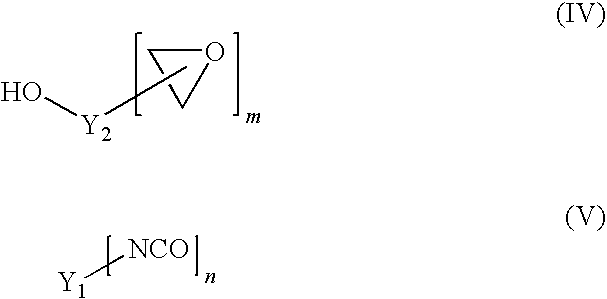Low-Temperature Impact Resistant Thermosetting Epoxide Resin Compositions With Solid Epoxide Resins
a thermosetting epoxide resin and solid epoxide technology, which is applied in the direction of synthetic resin layered products, adhesive types, transportation and packaging, etc., can solve the problems of falling well below the requirements, typical epoxy adhesives are usually too brittle, and the automobile industry, etc., to achieve high impact strength and simplify the preparation process
- Summary
- Abstract
- Description
- Claims
- Application Information
AI Technical Summary
Benefits of technology
Problems solved by technology
Method used
Image
Examples
examples
[0107]Highlighted below are a number of examples which further illustrate the invention but are in no way intended to restrict the scope of the invention. The base materials used in the examples are listed in Table 1.
TABLE 1Base materials employedBase materials usedSupplierBisphenol A diglycidyl ether (=DGEBA)HuntsmanAraldite GT 7071 (solid resin)Huntsman(EP equivalent weight about 515 g / EPequivalent)Dicyandiamide (=Dicy)DegussaIsophorone diisocyanate (=IPDI)Degussa-HülsCaprolactamEMS ChemieN-ButylamineBASF4,4′-Diphenylmethylene diisocyanate (=MDI)BayerHexanediol diglycidyl etherPrümmerAlcupol ® D-2021 (difunctional polypropyleneRepsolglycol)(OH equivalent weight = 1000 g / OH equivalentDesmophen 3060 BS (trifunctionalBayerpolypropylene glycol)OH equivalent weight = 1000 g / OH equivalentPolyTHF 1800 (difunctional polybutyleneBASFglycol)(OH equivalent weight = 900 g / OH equivalentPolyTHF 2000 (difunctional polybutyleneBASFglycol)(OH equivalent weight = 1000 g / OH equivalentPoly bd ® R45 H...
example b-01
[0111]80 g of PolyTHF 1800 (OH number 62.3 mg / g KOH), 55 g of Poly-bd® R-45HTLO (OH number 46.6 mg / g KOH), and 65 g of Alcupol D2021 (OH number 56.0 mg / g KOH) were dried under reduced pressure at 100° C. for 30 minutes. Subsequently 46.2 g of IPDI and 0.04 g of dibutyltin dilaurate were added. The reaction was carried out under reduced pressure at 90° C. until the NCO content was constant at 3.44% after 2.5 h (theoretical NCO content: 3.6%). Subsequently 117.6 g of the above-described trimethylolpropane glycidyl ether were added as monohydroxyl-containing epoxide of the formula (IV). Stirring was continued under reduced pressure at 90° C. until, after a further 3 h, the NCO content had dropped below 0.1%. This gave a clear product having an epoxide content (“final EP content”) of 2.47 eq / kg.
[0112]Preparation of polymer B:
example b-02
[0113]200 g of PolyTHF 2000 (OH number 57.5 mg / g KOH) were dried under reduced pressure at 100° C. for 30 minutes. Subsequently 47.5 g of IPDI and 0.04 g of dibutyltin dilaurate were added. The reaction was carried out under reduced pressure at 90° C. until the NCO content was constant at 3.58% after 2.5 h (theoretical NCO content: 3.70%). Subsequently 118.0 g of the above-described trimethylolpropane glycidyl ether were added as monohydroxyl-containing epoxide of the formula (IV). Stirring was continued under reduced pressure at 90° C. until, after a further 3 h, the NCO content had dropped below 0.1%. This gave a clear product having an epoxide content (“final EP content”) of 2.50 eq / kg.
[0114]Preparation of polymer B:
PUM
| Property | Measurement | Unit |
|---|---|---|
| Temperature | aaaaa | aaaaa |
| Temperature | aaaaa | aaaaa |
| Temperature | aaaaa | aaaaa |
Abstract
Description
Claims
Application Information
 Login to View More
Login to View More - R&D
- Intellectual Property
- Life Sciences
- Materials
- Tech Scout
- Unparalleled Data Quality
- Higher Quality Content
- 60% Fewer Hallucinations
Browse by: Latest US Patents, China's latest patents, Technical Efficacy Thesaurus, Application Domain, Technology Topic, Popular Technical Reports.
© 2025 PatSnap. All rights reserved.Legal|Privacy policy|Modern Slavery Act Transparency Statement|Sitemap|About US| Contact US: help@patsnap.com



